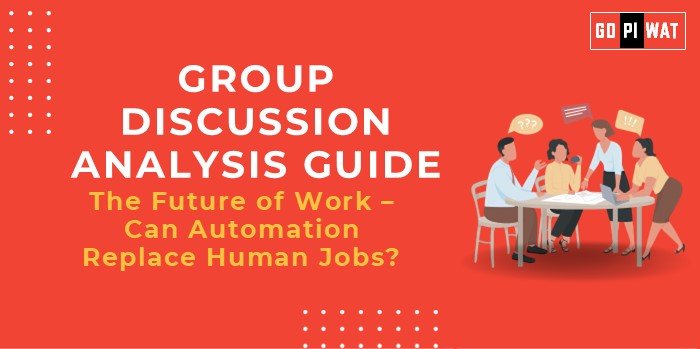📋 Group Discussion Analysis Guide
🌟 The Future of Work – Can Automation Replace Human Jobs?
🌐 Introduction to the Topic
- Opening Context: Automation, fueled by advancements in Artificial Intelligence (AI), robotics, and machine learning, is reshaping industries globally. While automation boosts efficiency and reduces costs, it raises concerns about job displacement, retraining needs, and the human workforce’s future role.
- Topic Background: From industrial automation in the 20th century to AI-driven tools in the 21st century, the question of “Will machines replace humans?” has persisted. Recent studies suggest that by 2030, automation could impact 20-30% of global jobs. At the same time, it can create new opportunities requiring different skill sets.
📊 Quick Facts and Key Statistics
- 📉 Automation Impact: 800 million jobs globally could be displaced by 2030 due to automation (McKinsey Report).
- 📈 AI-Driven Growth: AI is expected to contribute $15.7 trillion to the global economy by 2030 (PwC).
- 🛠️ Job Creation: Emerging technologies could create 97 million jobs globally by 2025 (World Economic Forum).
- 🇮🇳 India’s Workforce: 50% of Indian workers will require reskilling due to automation (NASSCOM).
👥 Stakeholders and Their Roles
- Governments: Policies for workforce reskilling, labor regulations, and AI adoption strategies.
- Corporates: Integrating AI while balancing human-machine collaboration.
- Employees: Adaptation through upskilling and reskilling to meet technological demands.
- Academia: Curriculum updates to match industry needs and emerging skills.
- International Organizations: Providing global benchmarks and technological ethics frameworks.
🏆 Achievements and Challenges
🌟 Achievements
- Increased Efficiency: Automation has reduced errors and increased productivity across industries, such as manufacturing, logistics, and healthcare.
- Job Creation in Emerging Sectors: Fields like data science, cybersecurity, and AI development are booming.
- Human-Automation Collaboration: Co-bots in industries like automobile assembly enhance productivity.
⚠️ Challenges
- Job Displacement: Workers in sectors like retail, transportation, and manufacturing face significant risks.
- Skill Gap: The workforce lacks technical skills required for new job roles.
- Economic Inequality: Unequal access to reskilling programs widens disparities.
🌍 Global Comparisons
- Japan: Leading in robotics for manufacturing but balancing human-machine collaboration.
- Germany: Successful upskilling through vocational programs like “Industry 4.0.”
📚 Case Studies
- Amazon’s Robotics: Increased warehouse efficiency but reduced demand for traditional workers.
- Indian IT Reskilling: Infosys and TCS launched upskilling initiatives to prepare employees for AI-driven roles.
🗣️ Structured Arguments for Discussion
- Supporting Stance: “Automation enhances productivity, reduces costs, and allows humans to focus on creative and complex tasks. For instance, AI-driven tools have revolutionized fields like medical diagnostics and finance analysis.”
- Opposing Stance: “Automation risks displacing millions of jobs, especially low-skill roles, leading to economic inequality. Workers without access to reskilling programs will be left behind.”
- Balanced Perspective: “While automation may replace some jobs, it also creates new opportunities requiring advanced skills. The future lies in human-machine collaboration with proactive reskilling initiatives.”
🎯 Effective Discussion Approaches
🌟 Opening Techniques
- Use impactful statistics: “By 2030, automation could displace 800 million jobs globally.”
- Contrast-based opening: “While automation improves efficiency, it raises concerns about job displacement and workforce adaptation.”
⚡ Counter-Argument Handling
“Though automation displaces jobs, countries like Germany have shown that reskilling can successfully transition workers into emerging roles.”
🔍 Strategic Analysis of Strengths and Weaknesses
- Strengths: Improved efficiency, cost reduction, creation of high-skill jobs.
- Weaknesses: Risk of job losses, skill gaps, lack of affordable reskilling opportunities.
- Opportunities: Reskilling programs, human-machine collaboration, AI ethics frameworks.
- Threats: Economic inequality, resistance to automation, ethical concerns over AI use.
🎓 Connecting with B-School Applications
📚 Real-World Applications
- Finance: AI-led financial models for predictive analysis.
- Operations: Robotics in supply chain optimization.
- HR: Managing change in a tech-driven workforce.
❓ Sample Interview Questions
- “How can organizations prepare employees for the shift caused by automation?”
- “What role can policymakers play to ensure automation leads to inclusive growth?”
💡 Insights for B-School Students
- Understanding automation’s impact on leadership strategies.
- Exploring AI’s role in enhancing business efficiency and sustainability.


